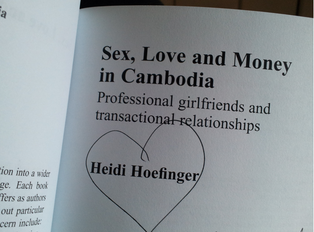
I'm super excited to share the first sex worker community review of my book, posted on the Kiss for Gabriela website, and written by filmmaker PJ Starr. And what better day to launch the review than on December 17, the International Day to End Violence Against Sex Workers. A huge THANK YOU to Laura Murray for her inspiring film and website, A Kiss for Gabriela, and to PJ Starr for writing such a warm and passionate review.
The text of the review can be found below. The actual review can be found on the website:
http://www.akissforgabriela.com/?cbg_tz=300&p=3717
Today is December 17. Globally sex workers, allies of sex workers, and organizations of sex workers are calling for an end to violence. December 17 is the International Day to End Violence Against Sex Workers. Today sex workers challenge the notion that the violence committed against them and their communities is acceptable. They also challenge notion that to engage in commercial sex is a form of violence in and of itself. They resist the imposition of simplistic frameworks and “victimization” of those who do not yet accept that sex work is work.
Heidi Hoefinger’s “intimate” ethnographic study of “professional girlfriends” in Cambodia is the kind of book we need to read today in this spirit. Recently released in paperback edition in 2014, Sex, Love and Money in Cambodia is the author’s meditation on the steps students and scholars can take to respectfully engage with “the other.” (And who is more othered by American and European scholars/policy makers/pundits than South East Asian women engaging in what at first glance could be simplistically described as prostitution?) “I have adopted an ethical stance to take up [research] participants’ concerns, problems, desires and expectations as seriously as I take my own,” writes Hoefinger, who is also a member of the advocacy group SWOP-NYC and who has a long history of engaging in sex worker rights organizing, “to interrupt global discourse by channelling voices which are otherwise passed over and ignored.” The global discourse she seeks to unsettle includes misguided “anti-trafficking measures” promulgated by New York Times’ columnist Nicholas Kristoff who Hoefinger notes live tweeted a brothel raid in Cambodia with (now deposed) trafficking icon Somaly Mam. In the region sex worker organizations, such as EMPOWER Thailand, have made it clear that the “trafficking discourse” itself is a source of real harm and violencenothing that, “there are more women in the Thai sex industry who are being abused by anti-trafficking practices than there are women being exploited by traffickers.”
Hoefinger staunchly seeks ways for the “professional girlfriends” she befriends in Cambodia to tell their own stories and express their reality. These women are employed in the bars and clubs in touristy areas in the urban centers of the country. They do not see themselves as “sex workers.” Rather they negotiate a spectrum of “transactional sex” relying on one or more relationships as a means of livelihood, performing intimacy “whereby the professed feeling of love and dedication lie somewhere on a continuum between genuine and feigned, and where the meaning of the term ‘love,’ itself ranges from sexual, passionate and/or romantic, to caring, respectful and appreciative.” Hoefinger’s observations ring true. This sounds like real life. Sex, Love and Money in Cambodia reminds (and/or awakens) the reader to the idea that sex work–whether we want to speak about that as engagement in the sex trade, transactional sex, professional girlfriending, GFE, and even plain old prostitution–is at its core also about human relationships and human sexuality. No wonder that so many sex workers also consider themselves counselors and express pride in what they do. No surprise that in order to create “perfect victimhood” amongst sex workers, overly controlling social workers, the police and the saviors want to reduce the unruly lives of people into the sex trade to repress these discussions of love and desire.
As filmmakers, storytellers, and anthropologists we were impressed and intrigued by Heidi Hoefinger’s attempts to engage in new forms of ethnographic practice–the Global Girls Autobiography/E-literacy Project, brokering participation in an avant guard documentary–that were only partially successful, but enlightening all the same. Despite her reservations, the documentary film project (directed by an “eclectic French-Italian photographer), built trust and rapport. “In the end,” Hoefinger found, “the film project clarified precisely the concept of ‘intersubjective time’ which is central to my methodology and the project as a whole… the women were happy to be paid to do something artistic, and the small compensation I earned from facilitating the interviews was used to fund the expense of the Global Girls Project.”
Sex, Love and Money in Cambodia (Professional Girlfriends and Transactional Relationships) by Heidi Hoefinger is now available in paperback from Routledge.
PUBLICADO EM DECEMBER 17, 2014 BY ADMIN POSTED IN BLOG

 RSS Feed
RSS Feed